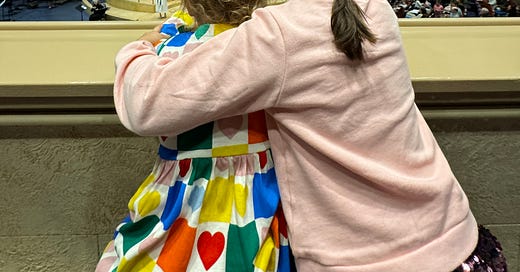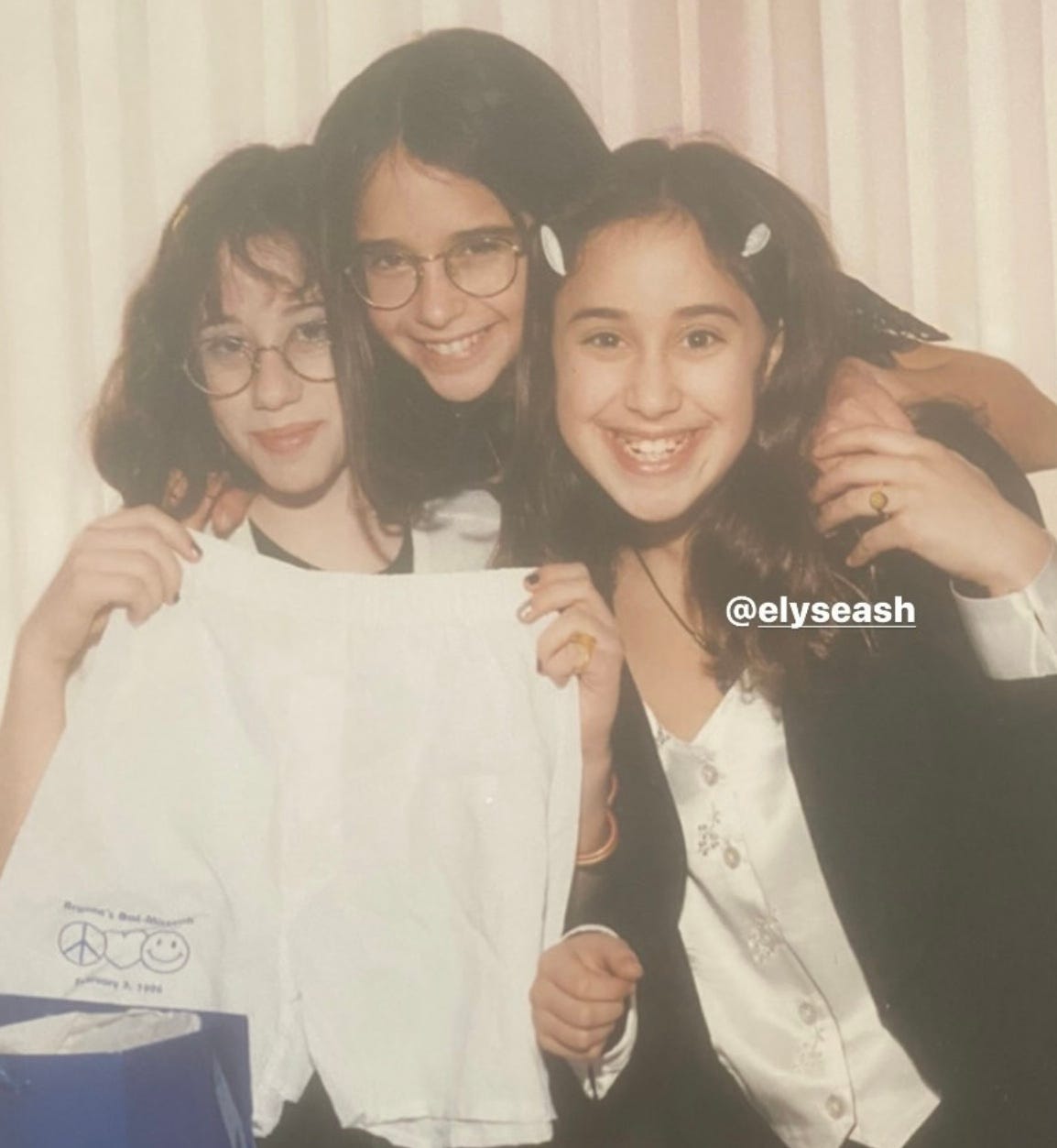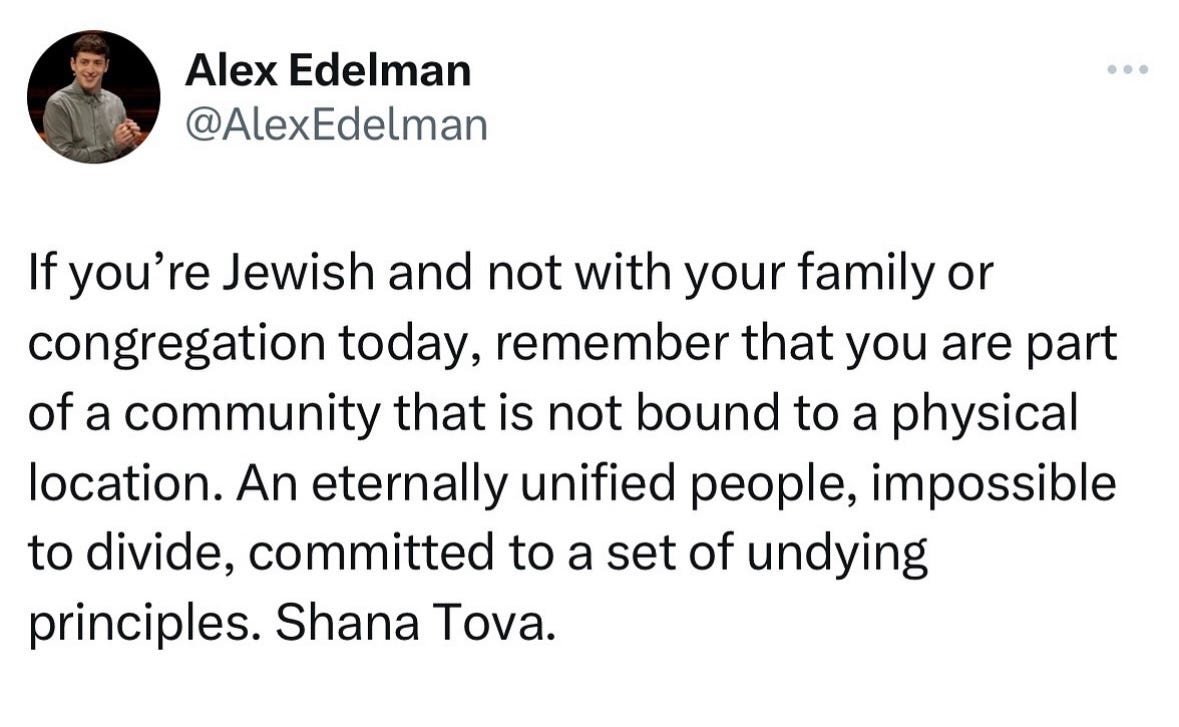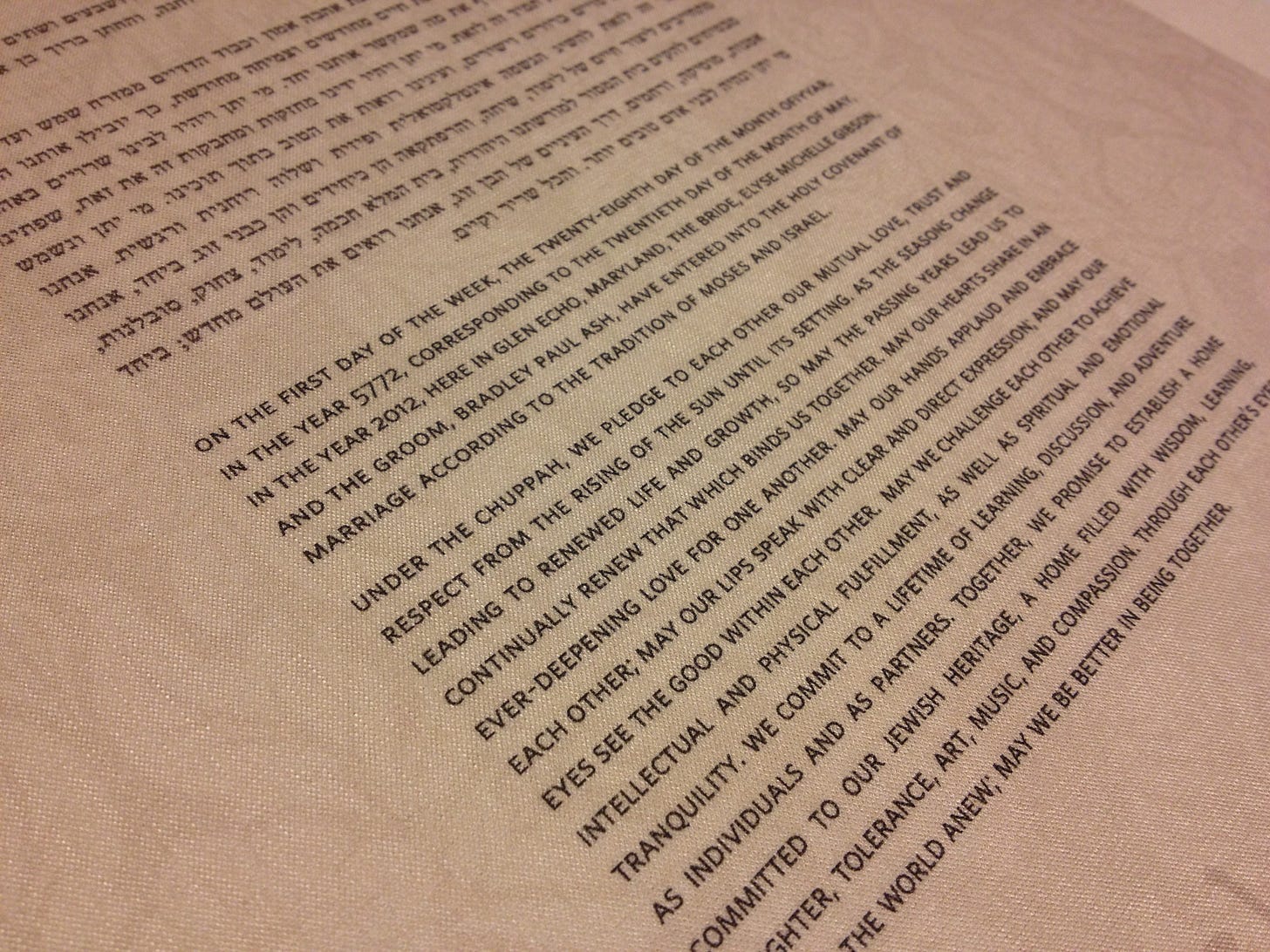Parenting + religion: Is raising your child with religion good/bad/both/neither?
"And thou shall teach them diligently onto thy children," unless they *really* don't wanna go to religious school.
There was a clear rule growing up in the Gibson household: kids must attend religious school at our reform synagogue and learn enough Hebrew to have our bat mitzvahs. After which, we were permitted to practice or not practice Judaism in whichever way(s) we liked (as long as we knew that not marrying someone Jewish would prompt Grandpa Julie to roll over in his grave and haunt us1).
Our mom and dad were both raised Jewish and all four of our grandparents were Jewish and this was simply non-negotiable. Our dad’s family was more “Dress in a Suit for Synagogue + Harmonize with the Hymns” religious and our mom’s family was more “Chinese Food + Debbie Friedman at Summer Camp” religious…but they were all Jewish in their quirky, crooked kippot ways. Dad loved singing in the choir. Mom lived in constant fear of being asked to join the Sisterhood. My sister, Becca, and I were along for the ride.
The way some parents push their kids to learn the piano or speak Spanish or finish their soggy broccoli, Becca and I were pushed to go to religious school until we were 13. I don’t even remember being given a “why” beyond that it was REALLY important to my family (both parents and all four grandparents). I won’t speak for Becca, but for me this approach paid off.
While I didn’t love going to religious school on Sunday mornings (show me a kid who does), I learned a lot about my religion, enjoyed celebrating the holidays, felt comfortable at synagogue and consequently in other Jewish spaces, sang along to many of the prayers/songs, loved going to Jewish summer camp, made Jewish friends, and just felt deeply connected to my small yet powerful community.
There’s a line in one of Judaism’s most holy prayers, The V’ahavta that commands Jews teach our laws and customs “diligently” onto our children. So in all honesty, I’m more than a little brainwashed myself. I’ve been saying this prayer my whole life—no wonder I’ve internalized the message.
Not to mention the whole, Judaism is a dying religion thing2. There are 15.7 million Jews in the whole world, which is approximately 0.2% of the population. So even if it’s not *technically* our job to procreate and raise the next generation of Jews, it’s definitely encouraged. Guilt has always been a pretty powerful motivator in Jewish culture.
This year, on the second Sunday of September, my six-year-old daughter Abigail whined, “UGH! I don’t wanna go to religious school! Do I really have to go!?”
Here we go, I thought.
Last year, Brad and I discussed whether we planned on signing up Abigail for religious school at our temple. There were a few downsides:
It’s expensive.
It’s EVERY Sunday (what if we want to get brunch or something instead!?)
Just walking past the synagogue these days makes me anxious, let alone thinking of my child in there without me, like a damn sitting duck for violent psychopaths. (Turns out, my instinct was right because they arrested some dude who was actively threatening our Temple).
Abigail is neurodivergent and is it even fair for us to ask her nervous system to sit nicely for an extra 2 hours a week to learn about old rabbis?
And maybe most importantly: is “forcing” religion onto your child something that will inevitably help them feel connected and tied to a community and set of values? Or does it leave them feeling resentful, detached and confused?
But I thought of a lot of pros, too. Primarily, that it’s important for Abby and Pippa to learn about our family’s religion, culture and values, even if they don’t want to practice as adults. I get so much from being Jewish. The prayers give me goosebumps. I feel seen and understood when I talk to other Jews. It’s a huge part of who I am, how I identify and how I feel connected to my ancestors. This sense of belonging is so valuable to me and not something I’d want to deprive anyone of, let alone my own children.
I thought this was sort of the trump card (are we still allowed to say that?) in my debate with Brad over whether we were going to push the girls into religious school. Like of course we were going to make them go—regardless of whether you believe in God or the Torah or whatever, it’s important to learn about your family and roots and values and where you come from, right?
Brad didn’t agree. He told me that growing up and being "forced” to go to Temple with his family made him less religious and more resentful. It had the opposite affect—creating a barrier between him and his community. He hated temple and everyone who went there. He hated all of it.
Today, he’ll go with me to synagogue if I ask. He knows the Hebrew prayers. He’ll even cook a brisket on Rosh Hashanah. But he’s not usually enjoying it. He’s mostly performing Judaism instead of feeling anything sincerely, which is pretty crappy to know as his partner.
It’s also worth noting that lots of Jews don’t go to religious school or temple at all. They don’t celebrate the holidays or know Hebrew or Yiddish. And they certainly don’t feel comfortable in a synagogue. Like all religions, Judaism is deeply personal and folks can identify as being part of the community while not performing it in ways that others do. Just because someone has a bar mitzvah or a bris or a giant loaf of challah on day 2 of Passover doesn’t make someone less Jewish than a Kosher, Orthodox Rabbi with 10 Jewish kids. Come at me.
But since Judaism is so personal, it also means that creating a new household brings up a whole bunch of new questions, even when you’re married to someone of your “same” religion.
I remember during the wedding planning process, Brad and I disagreed on a few of the Jewish traditions we wanted (and didn’t want) to incorporate. Brad didn’t want to wear a tallit. I didn’t want to circle him seven times. But we did want to break the glass, sign a ketubah, and dance the horah. It took some discussions and debates and compromises, but we got there.
That process was surprising, because I assumed we’d just agree on all of it. Which, of course we didn’t (although try getting Brad to agree with you on ANYTHING - it’s the most Jewish thing about him). Not only did we grow up in the same religion, we grew up going to neighboring temples. How differently could we possibly see things?
The answer: VERY differently.
And now there are all of these new, bigger religion-related questions…do we force the girls to go to religious school? What if they don’t want to go? What if they don’t feel safe there? What about camp? Why is this important? IS it important?
As a society, we used to raise our children in religion for many reasons, but mostly because we kind of had to. Being part of a church or synagogue or mosque was a way of showing the community that you were “chill” and “could hang” (the technical terms, I believe).
It demonstrated that you had a strong moral foundation and were a person and family that could be trusted. You had principals and dignity. You weren’t “other” and had nothing to hide. If you *didn’t* go to church, others noticed. It reminds me of the opening scene in Chocolat.
“If you lived in this village, you understood what was expected of you. You knew your place in the scheme of things and if you happened to forget, someone would help remind you.”
Today, it’s surprising if your family DOES attend church/temple/mosque with any sort of regularity. It’s unexpected. This isn’t a “kids these days,” kind of rant but more of a general observation.
According to this Pew Research article (whatever that means), Millennials are much less likely than older Americans to pray or attend church regularly or to consider religion an important part of their lives.
Anecdotally, most of my Millennial friends are no longer practicing the religion they grew up in. And while everyone’s relationship with spirituality, “God” and religion is dynamic and can change with time, I find it interesting that so many people who grew up going to religious school or following the rules of their religion in certain ways, are pretty agnostic now. Some even say they have religious trauma and do what they need to do to stay away from the systems and organizations that harmed them (FAIR).
My question is: were you “forced” into your religion growing up? Did it make you feel more connected to your family or more ostracized? Are you grateful for the lessons you learned or did they backfire? Do you wish your family had been more active in their religious community? Do you feel like you missed out on community by not being raised in a religious faith?
How do you think the role of religion is changing in today’s Millennial and Gen Z (shudders) led families?
How are you raising your own children or honoring your own faith as an adult? How has your spirituality evolved at all (or has it not)? What are the parts of religion that work for you and inspire you and which are the parts that feel icky and forced (or worse)?
Pop off in the comments…
A note from my aunt Rhoda Lynch (sister of my mom and daughter of Grandpa Julie): “Grandpa Julie, is not rolling over in his grave…both parents accepted my husband who was Catholic and my religion of Judaism. Grandpa Julie not only was proud of his grandson, but took Greg to Israel for confirmation.”
A note from my uncle, Rabbi James Gibson (brother of my dad): “The Jewish people is small but not dying yet. 25 years ago we were stuck on 14 million. We’re now at 15.9 million thanks to Ortho families having 8-12 children…that still does not make up for the fact we were 18 million on 9/1/1939 when WWII broke out.”









There is a lot I could say here, but I want to give my two cents based on my own irreligious upbringing. Neither of my parents practiced the religions they were raised in (Catholicism and Baptist). They both had their own reasons but never really talked about it. It was a non issue. We were allowed to go to church/Sunday school/kiwanas with friends and relatives. My dad took us to midnight Mass once. We were given total freedom to believe and practice what and how we wanted. As a teen and young adult it turned into agnosticism with a fair amount of derision directed towards "those creepy religious people." An unintended side effect of all of this (I think) is that it sent the message that faith is transitory and practicing religion is a whim. And this is not just faith in God, this is faith in anything. I don't know how else to say it: it gave me a weak foundation. The older I got the more I kept searching for what fit exactly what I wanted exactly when I wanted it, and discarding it when whatever I found failed to measure up. It severely limited introspection and seeing how I could or should change to meet a set a standards that weren't born of my own flawed ego. I eventually chose Catholicism and whether I agreed with everything they said or not I was in. The day I told my dad I was going to be baptized Catholic at the age of 34, he hadn't been to Mass in decades. I was worried he would think I was crazy or depressed or who knows. His response to me was "oh that is such a relief." He thought he had done wrong by not forcing us to jump through the religious hoops. Sometimes parents make decisions because it made sense at the time, but looking back maybe they wish they hadn't (I know I do this constantly). His reaction showed me that even though he didn't practice he never lost his faith in God which is something he never told me. It never came up! This is also a trend I had noticed with a lot of Catholics (practicing and not practicing). They had this foundational faith in God that they never had to "return to" because it was already there. A constant. To me that was a beautiful thing. I don't know how much of this makes sense to anyone but myself, but I come down on the side of teaching the children. Adults can choose how they want to live their lives, but kids benefit from seeing that there is something bigger than them. Something that loves them and will always be there for them. And also a way to measure their choices outside of their personal sphere.